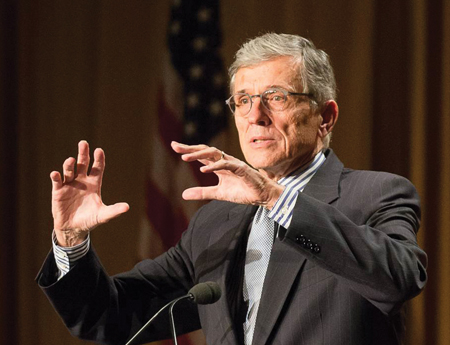Wheeler to Use 706 Authority To Restore Net Neutrality Rules

The smarter way to stay on top of broadcasting and cable industry. Sign up below
You are now subscribed
Your newsletter sign-up was successful
RELATED: FCC Republicans Pan New Net Neutrality Plan
FCC chairman Tom Wheeler has picked his path to restoring the anti-blocking and anti-discrimination network neutrality rules that a D.C. court threw out last month, and it will be using its Sec. 706 authority, rather than reclassifying it as Title II, though he will keep Title II on the table to use if it is warranted.
That is according to a senior FCC official speaking to reporters on background Feb. 19. The goal is to enforce and enhance transparency, enforce no blocking, and find a way to stop unfair discrimination. The chairman is said to believe that the rules can be upheld under Sec. 706.
The FCC will not challenge the court decision, but instead will set about restoring new rules of the road using that 706 authority and the court's instruction that the FCC had the authority to regulate broadband. The chairman will also explore promoting municipal broadband competition by possibly removing state barriers.
The FCC will look at its data roaming order, as the court suggested, for help in anchoring the new rules in 706 authority, as well as the court's guidance that the FCC is correct in concluding that ISPs have the incentive and ability to discriminate against over-the-top video and data competitors.
The FCC is launching a rulemaking seeking input on how to use that 706 authority, and will open a docket for comment on the court decision. But it will also keep the Title II docket open as another place for input. It would also be available if the FCC's new tack on the rules did not pass muster in court.
The chairman is also calling on cable ops and other ISPs to hold to their promise of preserving an open Internet while the FCC comes up with the new rules, which an FCC official said are expected to be proposed by late spring or early summer.
The smarter way to stay on top of broadcasting and cable industry. Sign up below
In a blog posting Feb. 18, the White House endorsed whatever route Wheeler decided to take, including saying that reclassifying broadband access as common carrier service would "give the FCC a distinct set of regulatory tools to promote net neutrality."
Comcast, the nation's top cable operator and ISP, is already subject to those anti-blocking and anti-discrimination rules through 2018, per its merger condition on the NBCU deal. The FCC could stretch that even longer as a condition on the just-proposed Time Warner Cable merger if it approves it.
Comcast executive VP David Cohen said last week he supported using the FCC's 706 authority to restore the rules. But cable ops had described Title II as a "nuclear option."
At a Jan. 15 Hill hearing, current National Cable & Telecommunications Association chairman Michael Powell, who was FCC chair when the commission classified cable broadband as an information service free of the common carrier mandatory access regs that applied to dial-up, warned against trying to classify broadband as a Title II service in the wake of that decision—former Democratic chairmen Michael Copps and Reed Hundt didn't have a problem with going that route.
The 706 section, part of the 1996 Telecommunications Act, directs the FCC to determine whether advanced telecommunications "capability" is being deployed in a reasonable and timely manner to all Americans, and if it determines that is not the case, it may impose "price cap regulation, regulatory forbearance, measures that promote competition in the local telecommunications market, or other regulating methods that remove barriers to infrastructure investment."
It is the FCC's finding in 2010 that broadband was not being deployed in a timely manner—a point argued by Republican commissioners and ISPs at the time—that paved the way for the FCC's Open Internet order. That conclusion was a change from previous FCC findings.
On Jan. 14, a three-judge panel of the U.S. Court of Appeals for the District of Columbia unanimously vacated the anti-blocking and anti-discrimination rules, essentially the heart of the Open Internet order, leaving in place a requirement that ISPs be transparent about how they were treating network traffic.
The court said the FCC has the authority to "promulgate rules governing broadband providers' treatment of Internet traffic," and said that its "justification for the specific rules at issue here—that they will preserve and facilitate the 'virtuous circle' of innovation that has driven the explosive growth of the Internet—is reasonable and supported by substantial evidence."
But it concluded that because the FCC has not classified ISPs as common carriers, it cannot regulate them as though they were.
"[E]ven though the Commission has general authority to regulate in this arena, it may not impose requirements that contravene express statutory mandates," the court said. "Given that the Commission has chosen to classify broadband providers in a manner that exempts them from treatment as common carriers, the Communications Act expressly prohibits the Commission from nonetheless regulating them as such," the court said. Because the Commission has failed to establish that, the anti-discrimination and anti-blocking rules do not impose per se common carrier obligations, we vacate those portions of the Open Internet Order."
Wheeler vowed following the decision that he would take action to preserve an open Internet. He has now laid out his plan of attack.
Contributing editor John Eggerton has been an editor and/or writer on media regulation, legislation and policy for over four decades, including covering the FCC, FTC, Congress, the major media trade associations, and the federal courts. In addition to Multichannel News and Broadcasting + Cable, his work has appeared in Radio World, TV Technology, TV Fax, This Week in Consumer Electronics, Variety and the Encyclopedia Britannica.

